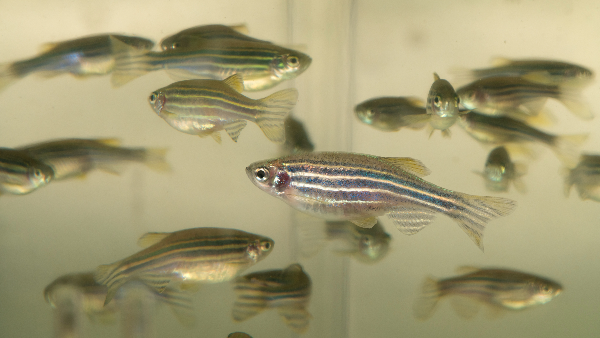It’s a Thursday morning in July and Lauren Rothwell ’26 sits in one of Bryant's research labs concentrating on a row of vials. Hovering a pipette over the third glass tube, she is busy setting up glycerol stocks to freeze bacteria. Since May, she and fellow researcher Makayla Griffin ’24 have worked with Biological and Biomedical Sciences Professor Steven Weicksel, Ph.D., on two ongoing melanoma-related research projects. Their long-term goal is to identify new genes involved with cancer, so it can help further people’s understanding of the disease.
“Cancer is characterized by unregulated cell growth and stems from changes in an organism’s genome, leading to misregulation of the genes,” says Weicksel.
Approximately 1.9 million new cancer cases are projected to occur in the United States in 2023, according to the American Cancer Society, and a report from the Skin Cancer Foundation reveals that one in five Americans will develop skin cancer, the most common form of cancer worldwide, by age 70.
Weicksel says the students’ first project in the lab looks at gene activation and how a nucleus's DNA is organized to regulate genes. He explains that within the nucleus, chromosomes twist in specific ways that are crucial for gene regulation; this organization dictates which genes are activated or repressed. Any disruption in chromosome organization can disrupt cell function and lead to diseases like cancer.
“We know there’s this switching between open and closed, and we can see the trends between disease and normal. But what happens at the molecular level — what proteins are involved, how those proteins target specific genes — those kinds of things are still not understood,” Weicksel says.
To answer these questions, Weicksel and student researchers developed a technique that maps the contacts made between pieces of DNA inside the nucleus, thus showing differences in gene expression. Students created cell lines with the technique, and these lines will be analyzed during the fall.
Weicksel says students gain practical skills and hands-on experience from helping out in the labs. If an experiment doesn’t go as planned, they learn to think through the problem and readjust. Like Rothwell and Griffin, many students work in the lab during the summer as part of a 10-week summer undergraduate research fellowship, while others volunteer during the school year or complete a directed study.
“It’s great to have the experiments work and get all this data, but I really hope they're figuring out their next step after Bryant,” Weicksel says.
In the second project, Rothwell and Griffin are looking at how certain cancer-identified proteins and DNA repair enzymes work. Weicksel says that when DNA is damaged, these enzymes will make fixes; however, in cancer cells these enzymes are often mutated.
“The hypothesis is that this helps breed more mutations,” Weicksel says, adding that students are looking at the polymerase theta enzyme since mutations in this enzyme have been identified in patient-derived melanoma tumors.
To determine if the enzyme plays a role in melanoma, Rothwell and Griffin cloned the zebrafish polymerase theta to see if it functions like the wild-type human version. Zebrafish, which is an inch-long striped fish from the tropics, has melanocytes that are similar to those on human skin — making them a great model for skin cancer.

After investigating the similarities between zebrafish polymerase theta and its human counterpart, Weicksel has ideas for more research down the line.
“There are zebrafish lines that are predisposed to getting cancer, so we are thinking about getting some those and testing our technique,” Weicksel says.
Back in the lab, Rothwell, a Biology major, puts down her pipette, picks up the tray of glass vials, and walks it to the adjacent lab where she places it in a centrifuge. For the next 10 minutes the tubes will spin around while she moves on to another part of the project.
“My plan is to continue working here during the school year as well,” Rothwell says, speaking to how she’s gained a deeper understanding of genetics and cell biology. “Working in the lab has had a profound impact on my education and has sparked a greater curiosity about scientific processes.”